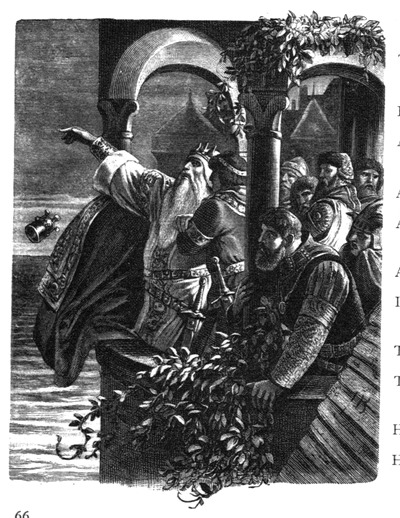Le lac
Ainsi, toujours poussés vers de nouveaux rivages,
Dans la nuit éternelle emportés sans retour,
Ne pourrons-nous jamais sur l'océan des âges
Jeter l'ancre un seul jour ?
Ô lac ! l'année à peine a fini sa carrière,
Et près des flots chéris qu'elle devait revoir,
Regarde ! je viens seul m'asseoir sur cette pierre
Où tu la vis s'asseoir !
Tu mugissais ainsi sous ces roches profondes,
Ainsi tu te brisais sur leurs flancs déchirés,
Ainsi le vent jetait l'écume de tes ondes
Sur ses pieds adorés.
Un soir, t'en souvient-il ? nous voguions en silence ;
On n'entendait au loin, sur l'onde et sous les cieux,
Que le bruit des rameurs qui frappaient en cadence
Tes flots harmonieux.
Tout à coup des accents inconnus à la terre
Du rivage charmé frappèrent les échos ;
Le flot fut attentif, et la voix qui m'est chère
Laissa tomber ces mots :
" Ô temps ! suspends ton vol, et vous, heures propices !
Suspendez votre cours :
Laissez-nous savourer les rapides délices
Des plus beaux de nos jours !
" Assez de malheureux ici-bas vous implorent,
Coulez, coulez pour eux ;
Prenez avec leurs jours les soins qui les dévorent ;
Oubliez les heureux.
" Mais je demande en vain quelques moments encore,
Le temps m'échappe et fuit ;
Je dis à cette nuit : Sois plus lente ; et l'aurore
Va dissiper la nuit.
" Aimons donc, aimons donc ! de l'heure fugitive,
Hâtons-nous, jouissons !
L'homme n'a point de port, le temps n'a point de rive ;
Il coule, et nous passons ! "
Temps jaloux, se peut-il que ces moments d'ivresse,
Où l'amour à longs flots nous verse le bonheur,
S'envolent loin de nous de la même vitesse
Que les jours de malheur ?
Eh quoi ! n'en pourrons-nous fixer au moins la trace ?
Quoi ! passés pour jamais ! quoi ! tout entiers perdus !
Ce temps qui les donna, ce temps qui les efface,
Ne nous les rendra plus !
Éternité, néant, passé, sombres abîmes,
Que faites-vous des jours que vous engloutissez ?
Parlez : nous rendrez-vous ces extases sublimes
Que vous nous ravissez ?
Ô lac ! rochers muets ! grottes ! forêt obscure !
Vous, que le temps épargne ou qu'il peut rajeunir,
Gardez de cette nuit, gardez, belle nature,
Au moins le souvenir !
Qu'il soit dans ton repos, qu'il soit dans tes orages,
Beau lac, et dans l'aspect de tes riants coteaux,
Et dans ces noirs sapins, et dans ces rocs sauvages
Qui pendent sur tes eaux.
Qu'il soit dans le zéphyr qui frémit et qui passe,
Dans les bruits de tes bords par tes bords répétés,
Dans l'astre au front d'argent qui blanchit ta surface
De ses molles clartés.
Que le vent qui gémit, le roseau qui soupire,
Que les parfums légers de ton air embaumé,
Que tout ce qu'on entend, l'on voit ou l'on respire,
Tout dise : Ils ont aimé !
The Lake
Forever swept to unknown shores away,
Propelled through endless night implacably,
Shall we not once on time’s primeval sea
Drop anchor for a day?
O Lake! a year is over. On this stone,
By these dear waves she should have viewed again,
Before you she was seated. I remain,
And sit to-day alone.
Just so, beneath these plunging cliffs, you roared,
And dashed yourself against their jagged walls;
Your wind-blown foam fell then, where now it falls,
Here on her feet adored.
Recall how we set out, one silent eve:
Nothing was heard between the waves and sky,
But noise of oars that stroked in harmony
The skein your waters weave.
Then, suddenly, to tones no mortals hear
The echoes on the spellbound shores awoke:
The flood gave heed; across the water spoke
The voice that I hold dear:-
“Time, halt in your flight, and you hours, as a favour,
Stop short and stand still in your ways!
Since pleasures are fleeting, let’s eagerly savour
Our best and most beautiful days!
“For the wretches who suffer, run swiftly, you hours;
They are many, and this they implore:
Put an end to their days, and their care that devours;
But the happy, I bid you ignore!
“For myself, I may crave a few moments - but no,
Time gives me the slip, takes flight:
I may say to the night, ‘Go slow, go slow’,
But the dawn will scatter the night.
“So to Love! Let us love! Seize the wings of the morn,
And delight in the scurrying day!
For Man has no haven, and Time has no bourn:
Time flies, and we vanish away!”
Time, jealous Time! In bursts of giddy joy,
Love inundates us with great happiness;
Do these a faster wayward flight employ
Than days of wretchedness?
What? Can we not pin down at least a trace?
What? Lost entirely? Gone for evermore?
Time gave, and Time is minded to efface;
And shall not Time restore?
Dark gulfs, eternity, the past, the void!
You swallow down our days; and what’s their fate?
Will you give back what you have once destroyed,
Our bliss, divinely great?
O Lake! Mute rocks and caves! Dim greenery!
Which Time shall spare, or render young again:
Natural Beauty! Guard this night for me,
Remember, and retain.
Both in your tempests let this memory dwell,
Fair lake, and in your calm; your slopes that smile,
And the black firs and, high above your swell,
The louring rocky pile;
And in your tremulous and fleeting breeze,
Your shore-sound that your further shore relays;
And the star silver-browed, whose clarities
Give whiteness to your glaze;
And moaning wind, and softly sighing reed,
Light perfumes, on your balmy zephyrs moved;
And everything that’s heard, or seen, or breathed:
All this shall say “They loved!”

